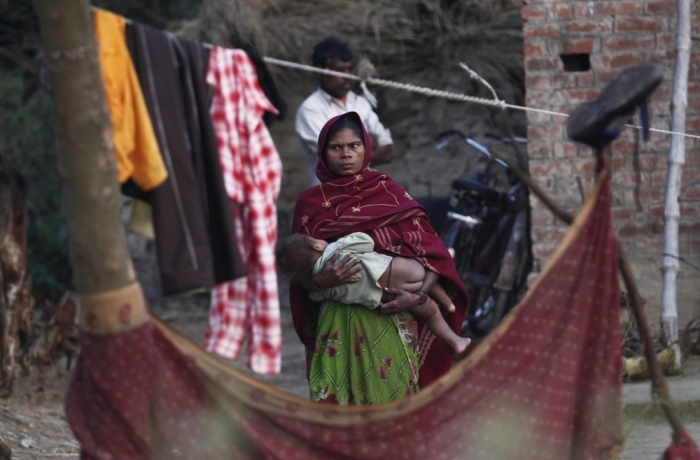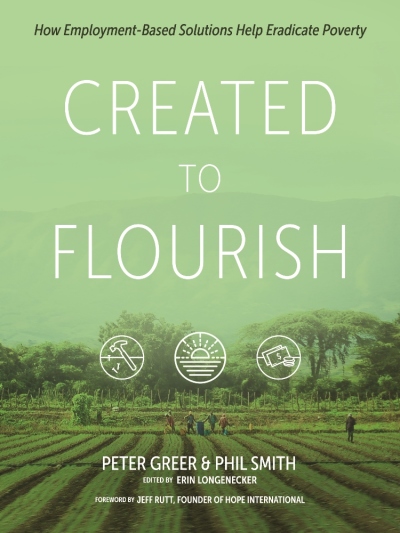Why Christians Should First Think About Jobs, Not Aid, to Help the World's Poor

The solution to eradicating poverty is jobs, not more humanitarian aid, say the authors of Created to Flourish: How Employment-Based Solutions Help Eradicate Poverty.
Peter Greer and Phil Smith are on a mission to change how Christians help impoverished people worldwide by showcasing models of economic development that have proven to be effective in alleviating poverty.
The book details their experiences working in some of the poorest nations in the world, and how their micro development efforts provide an accessible and inspiring vision to help Christians get past what Greer, president of HOPE International, calls "a crazy, false dichotomy" of people operating in between faith and works, particulary when it comes to the subject of helping the most destitute among us.
In an interview with The Christian Post, Greer referenced a Duke University study that examined how American churches address poverty. Their No. 1 response was food, the No. 2 response was shelter, and No. 3 was clothing.
"The very bottom of the list, the least common response that the Church in the United States has to this issue of poverty, is anything having to do with jobs or employment. Anything to do with allowing for individuals to care for their needs," Greer said.
"And we think that instead of that being the least common response we would have a different approach" that takes into consideration that individuals have gifts, abilities and dreams, he added.

Though it should seem obvious, the poor don't want to be someone else's charity base. They want to provide for themselves and their families.
"But they simply haven't had the opportunity to have a job that would allow them to do that."
To that end, Greer and Smith are equipping the Church to ask, "What would it look like to say that our default response was not pity or charity but employment and jobs?"
In recent years many have noted that when it comes to humanitarian aid and international poverty relief, something has gone really wrong. Books like Toxic Charity and When Helping Hurts, and films like "Poverty Inc." have all highlighted how good intentions often result in catastrophic harm.
But there are two responses to this, Greer added.
"One is, 'It's too hard so I'm going to stop trying,'" he said.

The other is, "How do we get better at helping people? How do we take our hearts that are full of compassion and empathy and say, because we want to love our neighbor well that means we're going to engage our minds and ask some of the important questions like, 'Does our help really make a positive impact?'
"Instead of assuming that people can't do for themselves, we want to first ask, 'How can we first help you provide for yourself?'"
Making that paradigm shift is everything.
Greer, 42, who is armed with degrees from Harvard's Kennedy School of Government and Messiah College, is an expert in his field, having worked in some of the poorest nations in the world. Now based in Lancaster, Pennsylvania, he first learned about the micro-enterprise development while studying in Moscow in 1995.
"I just got hooked, and never looked back," he told CP.
From 1999 to 2002 Greer lived in Rwanda, just a few short years after the horrific genocide in which nearly 1 million people were slaughtered. The poverty there at that time was staggering.
Yet today, when Greer returns to the tiny landlocked African nation he sees a country that has been transformed. The World Economic Forum noted last year that between the years of 2001 and 2014, the Rwandan economy grew 8 percent and continues to grow rapidly.
"No nation has ever developed based on handouts from another country. It has always been somehow the economic engine that has allowed them to grow," Greer said.
When Greer recently visited Haiti he asked local leaders what was the biggest challenge they face.
"Their answer was so unexpected," he recalled. "They said, 'Indiscriminate charity from the West."
Such indiscriminate giving makes individuals even poorer because it causes them to see themselves as needy recipients as opposed to capable leaders.
"That, to me, is where it starts," Greer said. "This idea of 'do we have a vision' for the future that says we are going to roll up our sleeves, we're going to use what we have, we are not going to become a nation that is reliant on someone else, we have what it takes."
"Because of that, we in the developed nations have done an incredible disservice to our brothers and sisters when we have gone in with a message that says, 'You can't do this on your own. Let us do it for you.'"

In Chapter 4 of Created to Flourish titled "A Hand Up, Not a Handout," Greer draws upon the Bible for its wisdom on economic development and what leads to flourishing, noting how in the Old Testament the poor were to be taken care of in ancient Israel. He also mentions the Apostle Paul's words in his letters to the Ephesians and in 1 Thessalonians about how the early Church should think about work.
The authors' theology underpins everything in their work and even inspired the book's title, Created to Flourish.
"We believe that God created this world and made it good, and that we have this opportunity right now to be investing in people, investing in places, to get back to the way it was supposed to be. This idea of flourishing, this idea of shalom, that what was broken is being made right."
But if one wants to do this work, patience is a must.
"Employment is hard, it's difficult, it takes longer, and yet it provides far better results over the long term." Greer said, noting that too often Westerners operate with truncated timelines that sabotage long-term impact.
There is no question that there is a time for food distribution and short-term humanitarian relief — and the Church should show up in those moments, particularly when natural disasters strike, Greer said.
Yet, he added, "whenever there is a disaster aid pours in and the problem with that is then we end up chasing disaster after disaster," many times without ever doing anything to address the underlying problems that make those natural disasters in poor countries so devastating in the first place.
"But I think there is a massive change that happens when we say, 'We are going to stop doing for others and everything we do we are going to be doing with others."
"That small change of a word between 'for' and 'with' produces dramatically different results."
Watch the trailer for Created to Flourish below:




























